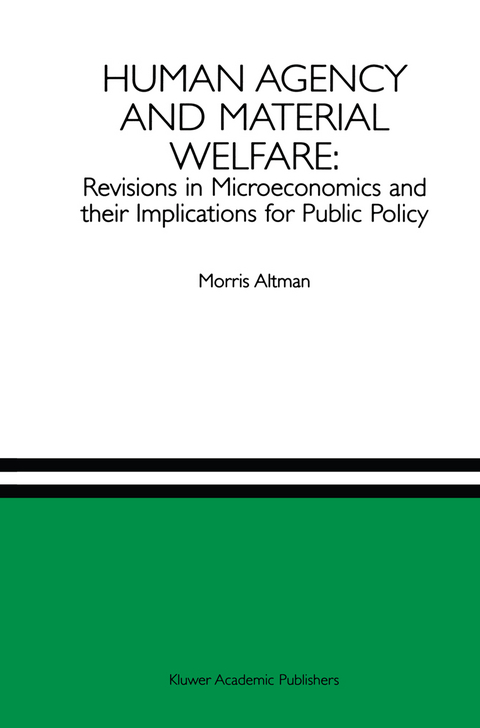
Human Agency and Material Welfare: Revisions in Microeconomics and their Implications for Public Policy
Springer (Verlag)
978-0-7923-9818-9 (ISBN)
In this book, the author offers a more inclusive theoretical framework and a more reasonable modeling of the economic agent. This new approach is built upon conventional neoclassical theory while incorporating the most recent research in behavioral economics. The case is made that individuals have some choice over the quantity and quality of effort which they can supply in the process of production. Even under the constraints of severe product market competition and the assumption of `utility maximizing' individuals, effort need not be maximized, especially in firms characterized by antagonistic management-labor relations. This is especially true when relatively inefficient firms can remain competitive by keeping wages relatively low - low wages serve to protect such firms from more efficient firms. Alternatively, relatively high wage firms can remain competitive only if they become more productive. Under these assumptions, higher wages and factors contributing to higher wages can advance the performance of an economy while lower wages can have the opposite effect and cultural and institutional variables, by themselves, can affect the long run productivity and even the long run competitiveness of firms and economies.
In summary, this book calls for a revised approach to the study of economics from a behavioral and socio-economic perspective, with significant consequences for public policy.
I: Introduction: Wrestling With the Neoclassical Colossus.- II: Human Agency as a Determinant of Material Welfare.- An Alternative Model of the Economic Agent.- Human Agency and Technical Change.- Utility, Leisure, and Welfare.- Conclusion.- III: Interfirm, Interregional, and International Differences in Labor Productivity: Variations in the Levels of X-Inefficiency as a Function of Differential Labor Costs.- The Existence of X-Inefficiency.- Wage Differentials and X-Inefficiency.- Conclusion.- IV: High and Low Wage Paths to Economic Growth: A Behavioral Model of Endogenous Economic Growth.- The Conventional Growth Model and Amendments.- High and Low Wages and the Path and Pattern of Economic Growth.- Conclusion: The Low Wage Economy and Market Failure.- V: The Economics of Exogenous Increases in Wage Rates in a Behavioral/X-Efficiency Model of the Firm.- The Existence of X-Inefficiency.- Wage Differentials, X-Inefficiency, and the Shock Effect.- Conclusion: X-Efficiency and Neoclassical Microeconomics.- Appendix: Conditions for Constant Unit Costs, Constant Profits, and Constant Rates of Employment Growth.- VI: Labor Market Discrimination, Pay Inequality and Effort Variability: An Alternative to the Neoclassical Model.- Discrimination and Pay Inequality.- Effort Discretion, Discrimination and Long Run Pay Inequality.- The Fair Wage Hypothesis, Discrimination and Pay Inequality.- X-Efficiency Theory and Pay Inequality.- The Basic Model.- Conclusion.- VII: A Critical Appraisal of Corporate Size and the Transaction Cost-Economizing Paradigm.- Transaction Costs, Competition and Corporate Bigness.- X-Efficiency Theory and Corporate Bigness.- Transaction Costs and X-Inefficiency.- X-Inefficient Institutions.- Conclusion.- References.
| Erscheint lt. Verlag | 31.12.1996 |
|---|---|
| Zusatzinfo | XV, 133 p. |
| Verlagsort | Dordrecht |
| Sprache | englisch |
| Maße | 155 x 235 mm |
| Themenwelt | Wirtschaft ► Volkswirtschaftslehre ► Makroökonomie |
| Wirtschaft ► Volkswirtschaftslehre ► Mikroökonomie | |
| ISBN-10 | 0-7923-9818-1 / 0792398181 |
| ISBN-13 | 978-0-7923-9818-9 / 9780792398189 |
| Zustand | Neuware |
| Haben Sie eine Frage zum Produkt? |
aus dem Bereich


